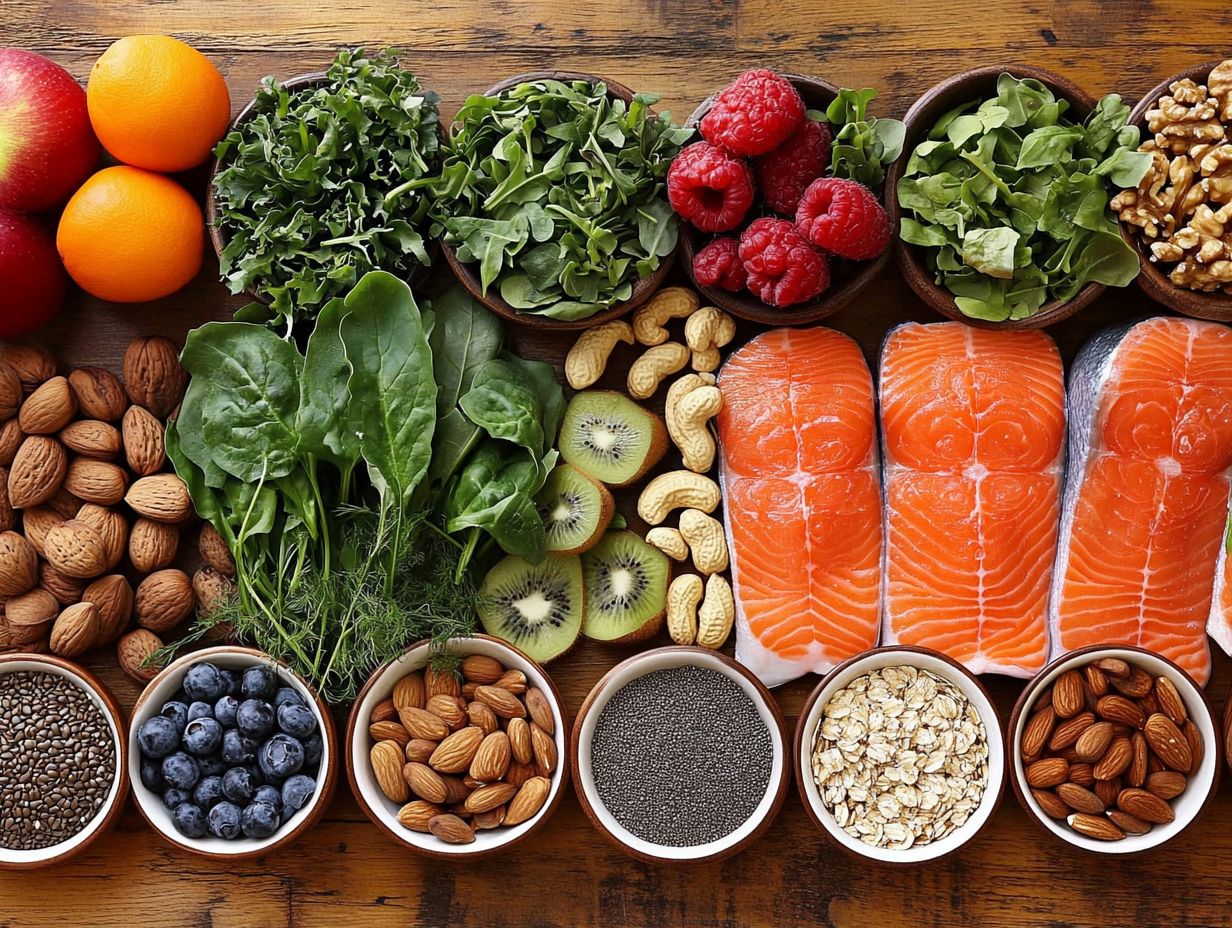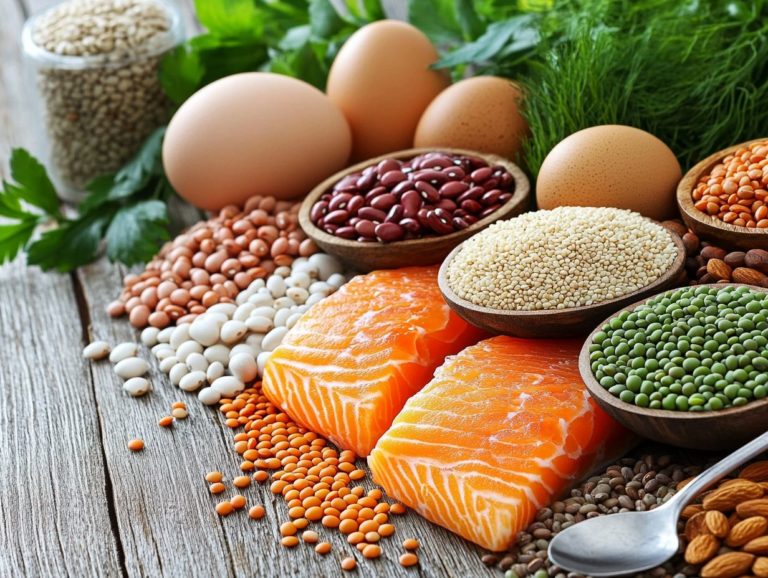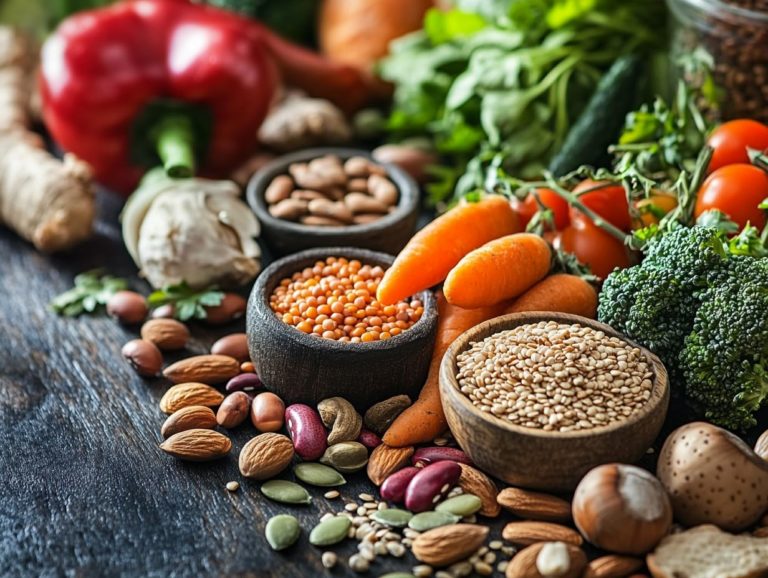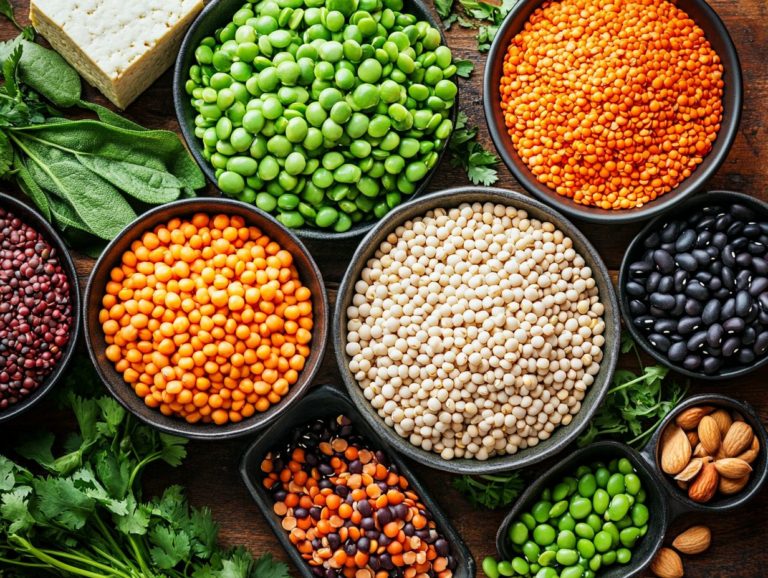Top Sources of Nutrients for Optimal Metabolism
Grasping the intricacies of nutrients and their important role in metabolism is essential for achieving optimal health and sustaining energy levels.
This article delves into the significance of macronutrients proteins, carbohydrates, and fats. It also discusses vital micronutrients, such as vitamins and minerals. Each plays a critical part in metabolic processes.
Discover the best foods to supercharge your diet and learn when supplements may be beneficial.
By the conclusion, you will have the insights needed to elevate your metabolism through well-informed dietary choices.
Contents
- Key Takeaways:
- Macronutrients for Optimal Metabolism
- Micronutrients for Optimal Metabolism
- Best Food Sources of Nutrients for Metabolism
- Supplements for Boosting Metabolism
- Frequently Asked Questions
- What are the top sources of nutrients for optimal metabolism?
- How do lean proteins support optimal metabolism?
- What are some examples of complex carbohydrates, and how do they support metabolism?
- Why are healthy fats important for optimal metabolism?
- What role do vitamins and minerals play in metabolism?
- How do antioxidants support a healthy metabolism?
Key Takeaways:

Protein, carbohydrates, and fats are your metabolism’s best friends. Eating a variety of whole foods is key to getting all the necessary vitamins and minerals for a healthy metabolism. While supplements can help boost metabolism, they should complement a well-balanced diet and be guided by a healthcare professional.
What are Nutrients and Why are They Important for Metabolism?
Nutrients are the essential building blocks your body needs to function at its best. They play an important role in metabolism, which is how your body changes food into energy.
To truly optimize your bodily functions, including digestion and energy levels, it’s crucial to understand the various types of nutrients. This includes macronutrients like proteins, carbohydrates, and fats. Micronutrients such as vitamins and minerals are also vital.
Proper intake of these nutrients can significantly influence your metabolic rate and overall health. Recent studies show that these nutrients help maintain energy balance and aid weight loss efforts.
Macronutrients serve as the key providers of energy for your daily activities. Micronutrients, despite being required in smaller amounts, play critical roles in metabolic pathways that enhance cellular functions and bolster immune responses.
For instance, B vitamins help turn carbs into energy quickly, while minerals like magnesium help your body use energy efficiently.
The interplay between these nutrients impacts not just weight management but also chronic disease prevention. Reputable sources like Harvard Health Publishing and the Mayo Clinic highlight this importance. Therefore, prioritizing a diverse intake of both macronutrients and micronutrients is essential for your vitality and long-term health benefits.
Macronutrients for Optimal Metabolism
Macronutrients proteins, carbohydrates, and fats are essential for your metabolism. They impact everything from energy expenditure to muscle mass and overall health.
Each macronutrient has its unique role:
- Proteins are vital for building and repairing tissues.
- Carbohydrates act as your body’s primary energy source.
- Healthy fats are essential for hormone production and nutrient absorption.
Striking the right balance among these macronutrients can profoundly influence your metabolic processes and weight management. Ultimately, this enhances your energy levels and digestion.
Start making these dietary changes today and unlock your body s full potential!
Protein, Carbohydrates, and Fats
Protein, carbohydrates, and fats are the three main nutrients our body needs in larger amounts. Each plays a distinctive role in your metabolism, energy levels, and overall health.
Proteins, found in legumes and lean meats, are essential for building and repairing muscle mass. Carbohydrates are your go-to source for vital energy needed for everyday activities.
Healthy fats, like those in avocados, are crucial for cellular function and vitamin absorption. When you consume these nutrients in balanced proportions, they collaborate to optimize your metabolic processes and support effective weight management.
Understanding the specific roles of each nutrient gives you the power to make informed food choices that enhance your digestion and energy levels.
Protein not only aids in muscle recovery but also has a higher calorie-burning effect during digestion compared to fats and carbohydrates. Complex carbohydrates, like whole grains and vegetables, provide steady energy throughout the day.
Healthy fats, such as those found in nuts and olive oil, are vital for hormone production and nutrient absorption, making them essential for overall health. By recognizing the interplay between these main nutrients, you can tailor your diet to support optimal health and performance.
Micronutrients for Optimal Metabolism

Micronutrients, encompassing vitamins and minerals, are essential for optimizing your metabolism and supporting a myriad of bodily functions. These range from energy production to immune health.
They play a crucial role in enhancing metabolic processes, reducing inflammation, and providing antioxidants that shield your body from oxidative stress. Ensuring you obtain these micronutrients through a diverse array of whole foods is essential for maintaining your energy levels and managing your weight effectively.
Vitamins and Minerals
Vitamins and minerals are essential micronutrients that significantly affect your metabolism and overall health. They influence how your body produces energy and manages weight effectively.
For instance, B-complex vitamins are critical for energy metabolism, while minerals like magnesium are essential for muscle function. By consuming a diverse array of foods rich in these nutrients such as omega-3 fatty acids found in fish you can support optimal metabolic function.
These nutrients play a pivotal role in various biochemical reactions that convert food into usable energy, emphasizing the importance of adequate intake. Take vitamin B12, for example; it s vital for red blood cell formation and proper nerve function.
Similarly, iron is crucial for oxygen transport, which directly impacts your energy levels. The best sources of these essential vitamins and minerals include:
- Leafy greens
- Nuts
- Seeds
- Lean meats
Health experts recommend that adults consume B vitamins ranging from 1.1 to 2.4 micrograms daily, depending on age and gender. Integrating these nutrient-dense foods into your diet can enhance metabolic health, boost mood, and reduce fatigue.
Best Food Sources of Nutrients for Metabolism
Incorporating the finest food sources of nutrients into your diet is crucial for optimizing your metabolism. These foods provide essential elements that fuel energy production and facilitate effective weight management.
Whole foods think legumes, lean meats, and fiery chili peppers are abundant in vital nutrients that can elevate your metabolic rate. Furthermore, indulging in foods like avocados grants you healthy fats that enhance nutrient absorption and promote overall well-being, contributing significantly to your energy balance.
Don’t wait to optimize your health! Start incorporating these nutrient-rich foods into your meals today for a healthier tomorrow!
Including a Variety of Whole Foods in Your Diet
Incorporating a variety of whole foods into your diet is essential for boosting your metabolism and providing your body with vital nutrients.
Think of whole foods like fruits, vegetables, whole grains, and legumes as your allies. They are rich in fiber, antioxidants, and essential vitamins and minerals.
A diverse diet ensures you receive all the nutrients necessary for effective metabolic processes and overall health. By embracing this dietary diversity, you can make a meaningful impact on your well-being, even aiding in weight management.
The fiber found in whole foods plays a key role in maintaining a healthy digestive system. It helps prevent issues like constipation and promotes a sense of fullness, which can help you avoid overeating.
A well-rounded selection of foods fuels your energy levels and provides you with various plant nutrients that enhance immune function. This combination of benefits paves the way for improved nutrition, increased vitality, and a sustainable approach to maintaining a healthy weight.
Supplements for Boosting Metabolism

Supplements can serve as valuable allies in your quest to boost metabolism, allowing you to elevate your energy levels and support your weight loss efforts.
A range of supplements, such as protein powders, caffeine, and green tea extract, has shown the ability to increase energy expenditure and enhance metabolic rate.
Probiotics may also benefit digestion and overall metabolic health, making them a noteworthy addition to a balanced diet.
Embracing these options can help you work toward your wellness goals more effectively.
When and How to Use Supplements
Using supplements effectively hinges on understanding when and how to incorporate them into your diet. This allows you to unlock their full potential for boosting metabolism and energy levels.
For example, protein supplements can work wonders for muscle recovery when taken post-exercise. Thermogenic supplements containing caffeine may be ideal before workouts to increase energy expenditure.
Remember, timing and dosage are crucial to maximizing effectiveness and aligning with your personal health goals. Customize your supplement regimen to fit your individual health needs, as age, physical activity level, and dietary habits significantly influence outcomes.
Cycling creatine enhances strength and performance, while regular intake of omega-3 fish oil bolsters cardiovascular health. Consulting reputable nutrition sources and professionals will refine your choices for a tailored approach.
Always stick to the recommended dosages to avoid potential side effects, ensuring that supplementation becomes a powerful ally in your journey toward overall wellness.
Frequently Asked Questions
What are the top sources of nutrients for optimal metabolism?
The top sources of nutrients for optimal metabolism include lean proteins, complex carbohydrates, healthy fats, vitamins, minerals, and antioxidants.
How do lean proteins support optimal metabolism?

Lean proteins, such as chicken, fish, and tofu, are essential for building and repairing muscles. They also help keep you feeling full, so you are less likely to overeat.
What are some examples of complex carbohydrates, and how do they support metabolism?
Complex carbohydrates, such as whole grains, vegetables, and beans, provide a slow and steady release of energy, which is important for maintaining a stable metabolism. They also contain fiber, which aids digestion and can keep you feeling full.
Why are healthy fats important for optimal metabolism?
Healthy fats, such as avocado, nuts, and olive oil, keep your metabolism running smoothly by providing essential fatty acids needed for various bodily functions. They also help balance blood sugar levels and keep you feeling satisfied.
What role do vitamins and minerals play in metabolism?
Vitamins and minerals are essential for your metabolism.
B vitamins help convert food into energy. Minerals like iron and magnesium are key to creating energy.
How do antioxidants support a healthy metabolism?
Antioxidants are found in fruits, vegetables, and spices.
They protect cells from damage and inflammation. Inflammation disrupts your metabolism, so keeping it in check is vital!






